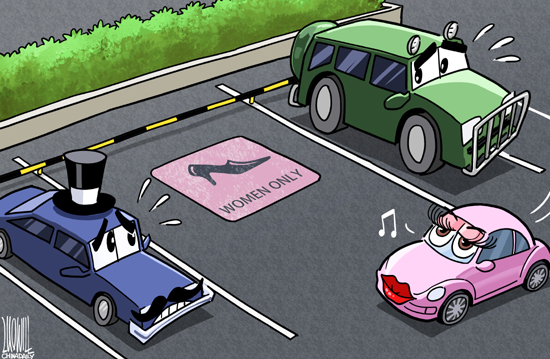Are women-only parking lots gender biased?


Editor's note: During the New Year holiday, a photo of a women-only parking lot with larger space and a logo of a high-heeled shoe at a highway service station in Hangzhou, Zhejiang province, went viral online, sparking a debate on whether such facilities are discriminatory toward women. A transportation expert and a writer with China Daily share their views on the issue:
Public facilities are for all to enjoy
Similar to those introduced in the Republic of Korea and Germany, China's women-only parking lots are designed for the safety and convenience of female motorists: they have more space than normal parking lots, are equipped with close circuit TV cameras and closer to work places.
Such parking lots have also been built in other places in China, such as Henan and Yunnan provinces, stirring debates on whether they are discriminatory as they suggest women's driving skills are inferior to those of men.
As for me, the gender of person has nothing to do with his or her driving skills, because they depend on how proficient a driver is behind the wheels. There is no need to set up special parking lots for female motorists in China, because there is not enough evidence to suggest women are clumsier drivers than men. In fact, women-only parking lots will, to some extent, enhance the stereotype that men are better drivers than women, which is not true.
Parking lots as public facilities should be equally accessible to both men and women. The controversy over women-only parking lots is not only uncomfortable, as they seem sexist, but also a kind of discrimination against men because it is unfair for them to have limited access to parking resources.
Chen Yanyan is a professor at the College of Metropolitan Transportation, Beijing University of Technology. This is an excerpt from her interview with China Daily's Yao Yuxin.
Not prejudiced toward women
This is not the first time that facilities designed exclusively for women's convenience have sparked controversy, because for some, such arrangements suggest women are inferior to men in some aspects. The special carriages for women in Guangzhou metro, introduced in July last year, stirred a public debate similar to the one on the women-only parking lot in Hangzhou.
It's ironical to consider a public facility with greater convenience as discriminatory. For instance, many train stations have special rest rooms for senior citizens, pregnant women and little children, but nobody has criticized this arrangement, or said they are a waste of public resources and discriminatory toward the elderly and kids.
The special parking lots have been designed to better protect woman drivers, especially at night, as they are close to work places and equipped with CCTV cameras. There is nothing wrong in building a parking lot with more space; in fact, it will make life more convenient for drivers on crowded days.
It's good to demand equal treatment, as Chinese women indeed "hold half the sky" and are as committed as men to improving their social status in terms of education, career and income. But women are still at a disadvantage when it comes to self-protection.
Overreacting to good-intentioned arrangements and labeling them discriminatory is to neither gender's benefit.
Zhu Ping is a writer with China Daily.


































